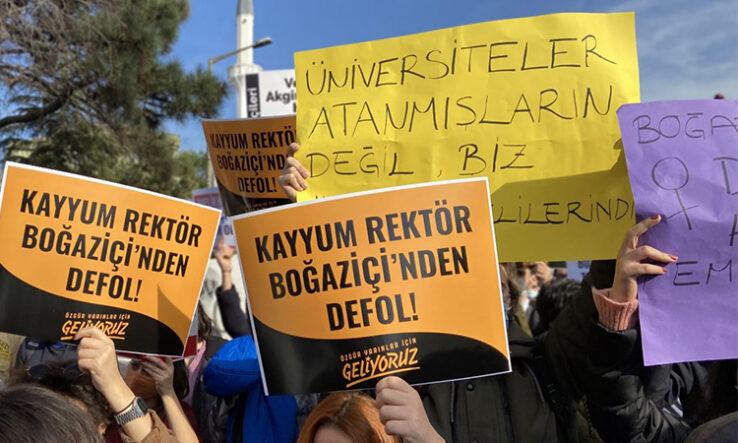
Image: Hilmi Hacaloglu - VOA
Erdoğan’s election victory promises renewed authoritarianism, but resistance remains, say Klas Borrell and Marco Nilsson
“The entire nation of 85 million won,” said Turkish president Recep Tayyip Erdoğan to a cheering crowd outside his 1,100-room palace in Ankara, when he declared himself re-elected on the evening of 28 May. Nothing could be farther from the truth.
Turkey is deeply polarised, and the elections did not bring the change that many hoped for. The power of the state and the influence of mass media, concentrated in the hands of Erdoğan’s Justice and Development Party (AKP), proved overwhelming. Disappointment is acute among the country’s academics, who have seen their freedom massively curtailed under Erdoğan’s rule.
In 2016, over a thousand Turkish academics signed a petition calling on the state to seek a peaceful solution to conflict with the Kurdish political movement, and accusing the government of massacring and deporting civilians. Erdoğan’s reaction was swift and brutal; the Higher Education Board, YÖK, took legal action against the signatories, with firings, arrests and imprisonments.
A failed military coup that year became a catalyst for an even broader attack on academic freedom. Erdoğan declared a state of emergency, followed by more detentions and dismissals.
The assaults have targeted individual academic freedom and university autonomy. In 2016, for example, Erdoğan reversed a law allowing faculty members to elect rectors. That power went to the YÖK, which nominates candidates for the president’s approval. According to a recent report on university autonomy by the European University Association, this makes Turkey the only higher education system in Europe where the president has the sole and final say on appointing rectors.
Defiance or resignation?
In 2017, we interviewed Turkish social scientists who had signed the Peace Petition. Half had been dismissed from their university positions and the rest lived in fear that they might be. Academics under threat of dismissal emphasised the difficulty of conducting research, as well as diminishing funding for projects deemed politically sensitive.
Several respondents talked about a growing institutional culture characterised by self-censorship in writing and in interactions with students and colleagues. Dismissed academics described concerns for their security, and their dire social and economic predicament. Some saw emigration as the only option; others hoped to eventually resume their academic careers in Turkey.
These interviews, as well as a later study we carried out on Street Academies—unofficial, outdoor lessons where dismissed academics reach out to the public—provided a complex picture. There was a great deal of resignation, but also defiance.
One expression of an unbroken will to defend academic freedoms is the protracted tug-of-war at the prestigious Boğaziçi University in Istanbul. In 2021, Erdoğan appointed an AKP member widely deemed academically unqualified as rector, without consulting the faculty.
Students and faculty rose up in protest. The police took hundreds of students into custody but, surprisingly, after more than half a year of protests, the regime retreated. The rector was removed, only to be replaced by another Erdoğan loyalist. In 2022, the conflict escalated when the YÖK ordered the dismissal of three deans for their participation in protests in defence of the university’s autonomy.
The events at Boğaziçi reveal much about the Erdoğan regime’s disregard for academic freedom and political micromanagement, but also about academics’ and students’ resilience. The question is whether this resilience will survive another five years of Erdoğan in office.
Many Turkish academics pinned high hopes on the recent election and on a victory for Erdoğan’s main opponent, Kemal Kılıçdaroğlu, leader of the National Alliance coalition of six opposition parties. The alliance had pledged to replace the executive presidential system with a strong parliamentary order and the restoration of the rule of law and civil liberty, and to meet several of the demands of academics and students, including the abolition of the YÖK in its current form.
Turkish academics are justifiably fearful for the country’s higher education system. Erdoğan’s victory in the presidential and parliamentary elections puts the AKP in an even stronger position, heightening the risks of still greater executive control and increasing authoritarianism. The future for academic freedom and university autonomy seems bleak.
Many young researchers and students have left the country, and there are indications that this brain drain will continue. At the same time, the resistance of Turkish students and faculty should not be underestimated.
As the protests at Boğaziçi University show, students and professors can challenge Erdoğan’s regime and its policies. But they need solidarity from the international scholarly community to stand up for academic freedom.
Klas Borell and Marco Nilsson are at Jönköping University in Sweden
This article also appeared in Research Europe